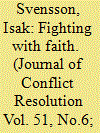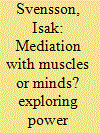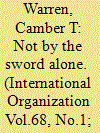| Srl | Item |
| 1 |
ID:
079923


|
|
|
|
|
| Publication |
2007.
|
| Summary/Abstract |
A growing literature has started to explore the relationship between religious dimensions and the escalation, duration, and termination of armed conflicts. This study explores the conditions for negotiated settlements. The author argues that if the belligerents' demands are explicitly anchored in a religious tradition, they will come to perceive the conflicting issues as indivisible, and the conflict will be less likely to be settled through negotiations. Utilizing unique data on the primary parties' religious demands and identities, all intrastate conflict-dyads in the Uppsala Conflict Data Program (UCDP), 1989-2003, are examined. The study finds that if governments or rebel-groups have made explicit religious claims, these conflict-dyads are significantly less likely than others to be terminated through negotiated settlement. By contrast, whether the primary parties come from different religious traditions does not affect the chances for negotiated settlement
|
|
|
|
|
|
|
|
|
|
|
|
|
|
|
|
| 2 |
ID:
079003


|
|
|
|
|
| Publication |
2007.
|
| Summary/Abstract |
Mediation research has for a long time been divided on whether 'power mediators' or 'pure mediators' are preferred as peace brokers in armed conflicts. This study contributes by drawing a broader empirical picture of international mediation in civil wars. It is argued that these approaches to international mediation are complementary rather than contradictory, and that combining power mediators with pure mediators should be the best way of enhancing the prospect of mediation success. Using data from the Uppsala Conflict Data Program on internal armed conflicts (1989-2003), the study examines and compares the effect of power mediators with pure mediators on different kinds of mediation outcomes: (1) the likelihood that parties reach agreements and (2) the provisions of those agreements. The study finds that although all types of mediators have a positive effect in terms of reaching agreements, power mediators outperform pure mediators. Most effective are the mediation attempts when both power and pure mediators are active as third parties. Examining the content of agreements, the study finds that pure mediators are more effective in reaching political and territorial power sharing provisions, whereas power mediators are more likely to be associated with military pacts
|
|
|
|
|
|
|
|
|
|
|
|
|
|
|
|
| 3 |
ID:
131487


|
|
|
|
|
| Publication |
2014.
|
| Summary/Abstract |
Scholars of civil conflict have long recognized the importance of state strength in the suppression of nascent insurgencies. However, previous empirical investigations have generally focused on the material and coercive dimensions of state power, obscuring the critical role played by the generation of widespread voluntary compliance through processes of political communication, that is, the production of "soft power." In contrast, in this article I focus on a factor-mass communication technology-that can enhance state capacity only by strengthening the state's ability to broadly and publicly disseminate political messages. I argue that the enhanced capacities for large-scale normative influence generated by mass communication technologies can be expected to produce substantial barriers to the mobilization of militarized challenges to state rule, by strengthening economies of scale in the marketplace of ideas. Utilizing newly compiled cross-national data on mass media accessibility in the post-World War II period, I show that densely constituted mass media systems dramatically reduce the probability of large-scale civil violence, thereby providing new evidence for the fundamental importance of nonmaterial state capacities in the suppression of internal armed conflicts.
|
|
|
|
|
|
|
|
|
|
|
|
|
|
|
|